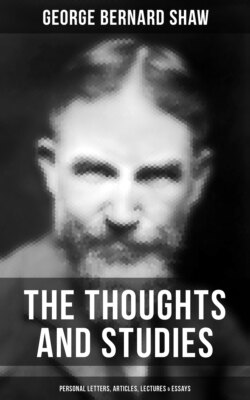Читать книгу The Thoughts and Studies of G. Bernard Shaw: Personal Letters, Articles, Lectures & Essays - George Bernard Shaw - Страница 56
На сайте Литреса книга снята с продажи.
PANACEA QUACKERY, OTHERWISE IDEALISM
ОглавлениеTable of Contents
Unfortunately, human enlightenment does not progress by nicer and nicer adjustments, but by violent corrective reactions which invariably send us clean over our saddle and would bring us to the ground on the other side if the next reaction did not send us back again with equally excessive zeal. Ecclesiasticism and Constitutionalism send us one way, Protestantism and Anarchism the other; Order rescues us from confusion and lands us in Tyranny; Liberty then saves the situation and is presently found to be as great a nuisance as Despotism. A scientifically balanced application of these forces, theoretically possible, is practically incompatible with human passion. Besides, we have the same weakness in morals as in medicine: we cannot be cured of running after panaceas, or, as they are called in the sphere of morals, ideals. One generation sets up duty, renunciation, selfsacrifice as a panacea. The next generation, especially the women, wake up at the age of forty or thereabouts to the fact that their lives have been wasted in the worship of this ideal, and, what is still more aggravating, that the elders who imposed it on them did so in a fit of satiety with their own experiments in the other direction. Then that defrauded generation foams at the mouth at the very mention of duty, and sets up the alternative panacea of love, their deprivation of which seems to them to have been the most cruel and mischievous feature of their slavery to duty. It is useless to warn them that this reaction, if prescribed as a panacea, will prove as great a failure as all the other reactions have done; for they do not recognize its identity with any reaction that ever occurred before. Take for instance the hackneyed historic example of the austerity of the Commonwealth being followed by the licence of the Restoration. You cannot persuade any moral enthusiast to accept this as a pure oscillation from action to reaction. If he is a Puritan he looks upon the Restoration as a national disaster: if he is an artist he regards it as the salvation of the country from gloom, devil worship and starvation of the affections. The Puritan is ready to try the Commonwealth again with a few modern improvements: the Amateur is equally ready to try the Restoration with modern enlightenments. And so for the present we must be content to proceed by reactions, hoping that each will establish some permanently practical and beneficial reform or moral habit that will survive the correction of its excesses by the next reaction.
